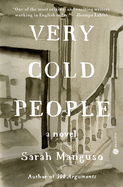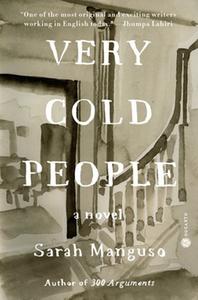
 "Snowfalls have unique bouquets," Sarah Manguso writes in her first novel, Very Cold People. "Snow isn't just frozen water; it carries a remnant of the sky." Manguso's book hosts impressions so scorchingly immediate that readers may half wonder if the childhood depicted on the page is theirs.
"Snowfalls have unique bouquets," Sarah Manguso writes in her first novel, Very Cold People. "Snow isn't just frozen water; it carries a remnant of the sky." Manguso's book hosts impressions so scorchingly immediate that readers may half wonder if the childhood depicted on the page is theirs.
Ruth, who narrates Very Cold People, grew up an only child in the 1980s in the (fictional) colonial town of Waitsfield, Mass., whose "historically correct" paint colors are considerably more subdued than its class distinctions. Ruth, a devotee of "playing at belonging," takes readers through the childhood events that have marked her--fleeting occasions like a trip to a fancy restaurant in Boston with family, and major developments like her move at age 13 to a new Waitsfield home (historically significant house, better school zone).
Guiding young Ruth with varying degrees of sound judgment are her Jewish mother, a serially dieting, status-conscious housewife, and her father, an accountant of Italian ancestry who wears a fake Rolex. Ruth's parents are a good match for each other but not for their child, as they undermine her confidence as well as are screamers and nonreaders (the books they pick up at the local dump's book swap are for show).
Manguso, whose previous books are works of poetry and nonfiction (Ongoingness; 300 Arguments), is a sensational writer (her school auditorium "was like the inside of a slaughtered animal, all oxblood paint and maroon velveteen"). But with a hundred-odd pages behind them, readers may well wonder: Is Very Cold People truly a novel, as advertised? Manguso certainly massages her themes (social and familial alienation, predatory men who are trusted members of the community), but as vignette-like paragraphs skip by, each bluntly delineated from the next by a page break, there seems to be no forward momentum beyond the ticking of time.
Readers should hang in there. Manguso's accreting vignettes retroactively assume a shape toward the end of Very Cold People, when something happens that fulfills every novel's basic requirement: life for at least one character in it irrevocably changes. Given Ruth's fascination with Waitsfield--its history, its denizens--it's tempting to imbue the town with an aura of specialness, and perhaps that's fair. But readers may come to see Waitsfield as more of a late-mid-century anytown, and they'll understand Ruth's desire to leave as a reflection of not the cruelties that Waitsfield inflicts but the cruelties that life can. --Nell Beram, author and freelance writer
Shelf Talker: Sarah Manguso's breathtakingly well-written first novel seems like a grab bag of the narrator's impressions of her childhood, until its ending casts everything that precedes it in fresh light.

